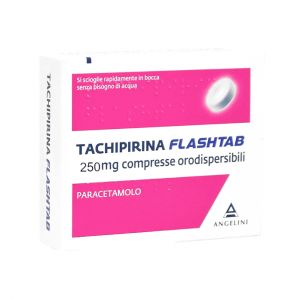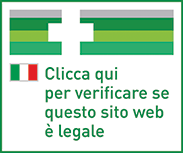Ship in Europe, Find out rates!
Tachipirina Flashtab 250 mg Paracetamol 12 Tablets

- box Delivery in Italy in 24/48 and free returns
- star3.000+ positive reviews
- dropboxOver 60,000 products in the catalog
Paracetamol based tablets.
Therapeutic indications
Tachipirina Flashtab is used for the symptomatic treatment of mild to moderate pain and / or fever.
Dosage and Posology
The drug should be taken according to the following doses and methods. This formulation is reserved for children weighing between 13 and 50 kg (approximately 2 to 15 years). For children it is essential to respect the dosage defined according to their body weight and therefore to choose the suitable formulation. Approximate ages as a function of body weight are given for information only. The recommended daily dose of paracetamol is approximately 60 mg / kg / day, to be divided into 4 or 6 daily administrations, i.e. approximately 15 mg / kg every 6 hours or 10 mg / kg at 4 hour intervals.
- For children weighing between 13 and 20 kg (approximately between 2 and 7 years): 1 tablet at a time, to be repeated if necessary after 6 hours, without exceeding 4 tablets per day.
- For children weighing between 21 and 25 kg (approximately between 6 and 10 years): 1 tablet at a time, to be repeated if necessary after 4 hours, without exceeding 6 tablets per day.
- For children weighing between 26 and 40 kg (approximately between 8 and 13 years): 2 tablets at a time, to be repeated if necessary after 6 hours, without exceeding 8 tablets per day.
- For children weighing between 41 and 50 kg (approximately between 12 and 15 years): 2 tablets at a time, to be repeated if necessary after 4 hours, without exceeding 12 tablets per day
The total dose of paracetamol should not exceed 80 mg / kg / day in children weighing less than 37 kg and 3 g per day in adults and children weighing 38 kg or more. In children, administration should be performed at regular intervals, including overnight, preferably at 6-hour intervals, or at intervals of not less than 4 hours. In case of severe renal insufficiency (creatinine clearance less than 10 ml / min), the minimum interval between 2 administrations should be 8 hours.
For children under the age of 6, the tablets should be dissolved in a tablespoon of water or milk (fruit juice can give a bitter taste) before being given. For children over 6 years of age, the tablets can be sucked: they dissolve very quickly in the mouth upon contact with saliva.
Overdose
There is a risk of liver damage (which includes fulminant hepatitis, liver failure, cholestatic hepatitis, hepatic cytolysis), particularly in elderly subjects, in young children, in patients with liver disease, in case of chronic alcoholism, in patients with chronic malnutrition and in patients receiving enzyme inducers. In these cases, overdose can be fatal. Symptoms usually appear in the first 24 hours and include: nausea, vomiting, anorexia, paleness, and abdominal pain. Overdose, 7.5 g or more of paracetamol in a single administration in the adult or 140 mg / kg body weight in a single administration in the child, causes necrosis of the hepatocytes which makes the induction of complete and irreversible necrosis likely, which it involves hepatocellular insufficiency, metabolic acidosis and encephalopathy which can lead to coma and death. At the same time, an increase in the levels of hepatic transaminases (AST, ALT), lactic dehydrogenase and bilirubin is observed, together with an increase in prothrombin time which may appear 12 to 48 hours after administration. Clinical symptoms of liver damage usually appear after two days and peak after 4 - 6 days. Acute renal failure with acute tubular necrosis can develop even in the absence of severe liver damage. Other non-hepatic symptoms that have been reported following paracetamol overdose include myocardial abnormalities and pancreatitis.
Emergency behavior • immediate transfer to hospital even if there are no significant early symptoms • drawing of a blood sample for an initial determination of the plasma paracetamol concentration • gastric lavage • intravenous (or oral if possible) administration of the antidote Nacetylcysteine possibly within ten hours of ingestion. N-acetylcysteine can, however, provide a certain degree of protection even after 10 hours, and up to 48 hours, but in these cases a prolonged treatment is performed. • symptomatic treatment should be carried out. • oral methionine can be used as an alternative to acetylcysteine as long as it is administered as soon as possible after the overdose and, in any case, within 10 hours of the overdose.
Contraindications
- Hypersensitivity to the active substance or to any of the excipients
- Phenylketonuria (due to the presence of aspartame)
- Severe hepatocellular insufficiency.
Side effects
- Hepatobiliary disorders: increased levels of hepatic transaminases
- Immune system disorders: hypersensitivity reaction (from simple skin rash or hives to anaphylactic shock requiring treatment to be discontinued)
- Blood and lymphatic system disorders: thrombocytopenia, leukopenia, neutropenia (sporadic reports)
Pregnancy and breastfeeding
Epidemiological data on the use of therapeutic oral doses of paracetamol show no adverse effects on pregnancy or on the health of the fetus / newborn. Prospective data on pregnancies exposed to overdoses did not show an increase in the risk of malformations. Reproduction studies performed with oral administration did not show any malformation or fetotoxic effects. Consequently, under normal conditions of use, paracetamol can be used during pregnancy after a benefit-risk assessment. During pregnancy, paracetamol should not be taken for long periods, in high doses or in combination with other medicines, since the safety of use in these cases has not been established.
After oral administration, paracetamol is excreted in breast milk in small quantities. No undesirable effects have been reported in breastfed infants. Therapeutic doses of this medicine can be taken during breastfeeding.
Special warnings
Do not exceed the recommended dose. Prolonged use of the product, other than medical supervision, can be harmful. This product should only be used if strictly necessary. Doses higher than those recommended carry a risk of very serious liver damage. Treatment with an antidote should be performed as soon as possible. To avoid the risk of overdose, patients should be advised to avoid concomitant use of other medicines containing paracetamol. This medicine contains aspartame, a source of phenylalanine, equivalent to 0.2 mg per tablet and, therefore, is contraindicated in people with phenylketonuria.
Paracetamol should be used with caution in case of: - Adults weighing less than 50 kg - Mild to moderate hepatocellular insufficiency (note: paracetamol is contraindicated in cases of severe hepatocellular insufficiency) - Chronic alcoholism - Chronic malnutrition (low reserves of hepatic glutathione) - Dehydration - Severe renal insufficiency
In the event of a high fever, or signs of secondary infection, or persistence of symptoms beyond 3 days, a re-evaluation of treatment should be carried out. During prolonged treatment with analgesic drugs, carried out with doses higher than those indicated in the package leaflet, headache may occur which should not be treated with higher doses of the medicine. In general, the habitual use of analgesics, especially the combination of different analgesic drugs, can lead to permanent kidney damage with the risk of renal failure (analgesic nephropathy). If this situation occurs or if its onset is suspected, it is necessary to consult the doctor and stop the treatment. The diagnosis of "analgesic overuse headache" should be considered in those patients who suffer from frequent or daily headaches despite (or due to) the regular use of headache medications.
Expiration and retention
Check the expiration date indicated on the package. The expiry date indicated on the package refers to the product in intact packaging, correctly stored. This medicine does not require any special storage conditions.
Warning : do not use the medicine after the expiry date indicated on the package.
Composition
One Tachipirina Flashtab tablet contains:
Active principle
Paracetamol 250 mg
Excipients
Mannitol (granules, powder) crospovidone aspartame (E951) currant flavor magnesium stearate


